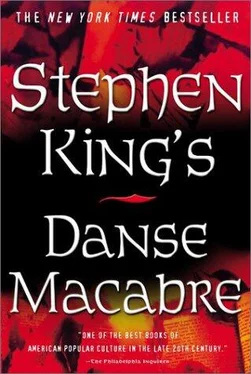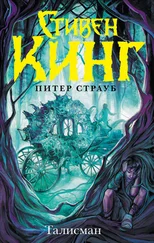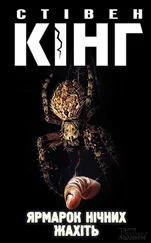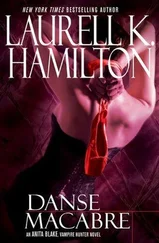"It's the best set of electric trains a boy ever had," Orson Welles once said of making movies; the same can be said of making books and stories. Here is a chance to bust that tunnel vision wide open, bricks flying everywhere so that, for a moment at least, a dreamscape of wonders and horrors stands forth as clearly and with all the magic reality of the first Ferris wheel you ever saw as a kid, turning and turning against the sky. Someone's dead son is on the late movie. Somewhere a foul man-boogeyman!-is slouching through the snowy night with shining yellow eyes. Boys are thundering through autumn leaves on their way home past the library at four in the morning, and somewhere else, in some other world, even as I write this, Frodo and Sam are making their way toward Mordor, where the shadows lie. I am quite sure of it.
Ready to go? Fine. I'll just grab my coat.
It's not a dance of death at all, not really. There is a third level here, as well. It is, at bottom, a dance of dreams. It's a way of awakening the child inside, who never dies but only sleeps ever more deeply. If the horror story is our rehearsal for death, then its strict moralities make it also a reaffirmation of life and good will and simple imagination-just one more pipeline to the infinite.
In his epic poem of a stewardess falling to her death from high above the fields of Kansas, James Dickey suggests a metaphor for the life of the rational being, who must grapple as best he/she can with the fact of his/her own mortality. We fall from womb to tomb, from one blackness and toward another, remembering little of the one and knowing nothing of the other . . . except through faith. That we retain our sanity in the face of these simple yet blinding mysteries is nearly divine. That we may turn the powerful intuition of our imaginations upon them and regard them in this glass of dreams-that we may, however timidly, place our hands within the hole which opens at the center of the column of truth-that is . . . . . . well, it's magic, isn't it?
Yeah. I think maybe that's-,what I want to leave you,-with, in lieu of a goodnight kiss, that Nvord which children respect instinctively, that word whose truth we only rediscover as adults in our stories . . . and in our dreams: Magic.
IN JULY OF 1977, my wife and I hosted a gathering of my wife's entire family-a giant collection of sisters, brothers, aunts, uncles, and millions of kids. My wife spent most of that week cooking and of course what always happens at family gatherings happened at this one: everybody brought a casserole. Much food was eaten on the shores of Long Lake that sunny summer day; many cans of beer were consumed. And when the crowd of Spruces and Atwoods and LaBrees and Graveses and everyone else had departed, we were left with enough food to feed an army regiment.
So we ate leftovers.
Day in, day out, we ate leftovers. And when Tabby brought out the remains of the turkey for the fifth or sixth time (we had eaten turkey soup, turkey surprise, and turkey with noodles; this day it was something simpler, nice, nourishing turkey sandwiches), my son Joe, who was then five, looked at it and screamed: "Do we have to eat this shit again ?” I didn't know whether to laugh or clout him upside the head. As I recall, I did both.
I told you that story because people who have read a lot of my work will realize that they have eaten a few leftovers here. I have used material from my introduction to Night Shift , from my introduction to the New American Library's omnibus edition of Frankenstein, Dracula , and Dr. Jekyll and Mr. Hide , from an article entitled "The Fright Report," originally published in Oui magazine, from an article called "The Third Eye" in The Writer ; much of the material on Ramsey Campbell originally appeared in Stuart Schiff's Whispers magagine.
Now before you decide to clout me upside the lead or to scream "Do we have to eat this shit again?" let me point out to you what my wife pointed out to my son on the day of the turkey sandwiches: there are hundreds of different recipes for turkey, but they all taste like turkey.
And coupled with that, she said, it is a shame to waste good things.
This is not to say that my article in Oui was so paralyzingly great or that my thoughts on Ramsey Campbell were so deathless that they deserved to be preserved in a book; it is only to say that, while my thoughts and feelings on the genre I've spent most of my life working in may have evolved or shifted somewhat in perspective, they haven't really changed. That change may come, but since there has only been a passage of four years since I originally stated many of my feelings about horror and terror in the Night Shift introduction, it would be surprising-even suspect-if I were to suddenly deny everything I had written previous to this book.
In my own defense, I'll add that Danse Macabre gave me the space to develop some of these ideas in more detail than I had ever been given before, and for that I must thank Bill Thompson and Everest House. In no case did I simply reheat something I had written before; I tried as hard as I could to develop each idea as fully as possible without beating it into the ground. In some cases, I may have done just that, though, and all I can do in such cases is to beg your indulgence.
And I think that really is the end. Thank you again for coming with me, and rest you well.
But, being who I am and what I am, I cannot find it in my heart to wish you pleasant dreams . . .
THE FILMS
Below is a list of roughly one hundred fantasy/horror films tied together by their time and their excellence. All were released during the period 1950-1980, and all of them seem to me to be particularly interesting in one way or another; if I may say so without sounding like an Academy Awards presenter, all of them have contributed something of value to the genre. You will find my own personal favorites marked with an asterisk ( * ). Special thanks are due to Kirby McCauley, who provided invaluable help with the list.
TITLE DIRECTOR YEAR The Abominable Dr. Phibes Robert Fuest 1971
* Alien Ridley Scott 1979
Asylum Roy Ward Baker 1972
The Bad Seed Mervyn LeRoy 1956
The Birds Alfred Hitchcock 1963
The Bird with the Crystal Plumage Dario Argento 1969
* Black Sunday Mario Bava 1961
* The Brood David Cronentberg 1979
Burnt Offerings Dan Curtis 1976
Burn Witch Burn Sidney Hayers 1962
* The Cage Walter Graumann 1961
* Carrie Brian De Palma 1976
The Conqueror Worm Michael Reeves 1968
* Creature from the Black Lagoon Jack Arnold 1954
* The Creeping Unknown Val Guest 1955
* Curse of the Demon Jacques Tourneur 1957
The Day of the Triiffids Steve Sekely 1963
* Dawn of the Dead George A. Romero 1979
The Deadly Beer Freddie Francis 1967
Deep Red Dario Argento ?
* Deliverance John Boorman 1972
* dementia-13 Francis Coppola 1963
Diabolique Henri-Georges Clouzot1955
Doctor Terror's House of Horrors Freddie Francis 1965
Don't Look Now Nicholas Roeg 1973
* Duel Steven Spielberg 1971
* Enemy from Space Val Guest 1957
Eraserhead David Lynch 1978
* The Exorcist William Friedkin 1973
The Exterminating Angel Luis Bunuel 1963
Eye of the Cat David Lowell Rich 1969
The Fly Kurt Neumann 1958
* Frenzy Alfred Hitchcock 1972
Читать дальше










